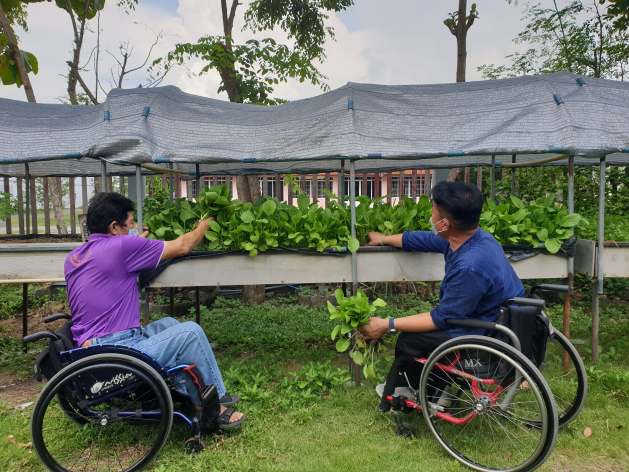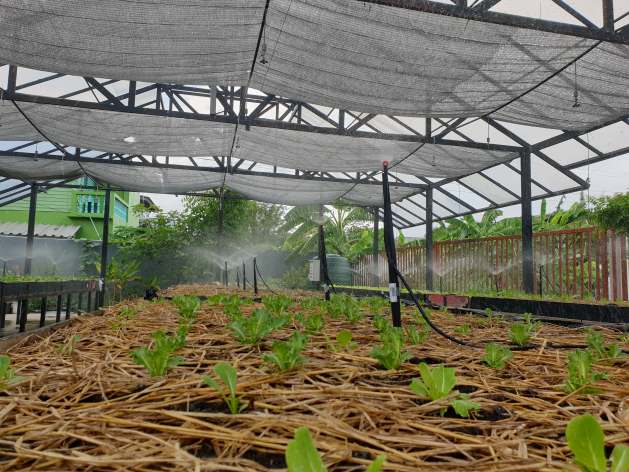Rawan Bo-khuntod (l) and an additional farmer planting seedlings (Picture by Pattama Kuentak/IPS)
Tucked absent in Pathumthaini province, on the outskirts of Bangkok, .24 hectares of land adjacent to the Seangsan temple grew to become an urban vegetable farm operate by customers of the Pathumthani Disabled Association.
The Samart Khon Samart farm consists of a significant open up greenhouse at the back again of the land. In a compact grassy industry at the entrance are 6 raised beds of Chinese cabbage (Brassicca rapa chinensis) and coriander. To one aspect are the office constructing and workshop.
Within the greenhouse, a few rows of lifted beds are loaded with seedlings of a assortment of salad greens, however too modest to recognise. The soil is coated with rice straw to defend the younger crops.
10 decades ago, Khoen Sapanyabut started the association to spotlight the schooling and work legal rights of individuals with disabilities.
The land, donated by the temple, is just about two kilometres from the principal street. A person aspect of the tree-lined street is flanked by a canal that is dotted with low-income properties and local community shops. The other facet is lined with every thing from factories and vacant land to a school.
With the land secured, Khoen, who utilizes a wheelchair, ponders what activity members should really concentrate on. He chose vegetable farming.
“People with disabilities have distinctive skills. Some are fantastic at computers or restoring products. But increasing vegetables is an exercise that anyone can do, even without right schooling,” he says.
The affiliation initially adopted hydroponic farming and grew greens these kinds of as lettuce, water spinach and Chinese cabbage, recognised regionally as bok choy. Despite the fact that these vegetables are effortless to expand and market, they are low-priced and unprofitable.
Also, owing to constrained place, generation could not fulfill demand from customers. The whole cost of hydroponics, like electricity, drinking water procedure and chemical fertiliser, also exceeded profits.
The change to soil-based farming transpired when the affiliation partnered with Bangkok University three yrs in the past and commenced acquiring once-a-year funding and assistance, which includes the greenhouse.
The farm now has 28 lifted beds in overall. All are developed at a particular height so that farmers in wheelchairs can be well accommodated. The aisles are also wheelchair available.
Nowadays, the farm grows purple and environmentally friendly oak lettuce, kale, romaine lettuce, frill ice, iceberg and butter lettuce, all of which are high-worth vegetables. All creation follows natural farming techniques, like compost, which is created by the members.
Rawan Bo-khuntod, 53, is dependable for the farm’s each day paperwork. He also does the e book holding and sometimes will help farmers get ready and plant seeds. Rawan suggests the work has boosted his doing work existence as a disabled individual since he notably enjoys administration.
It has also made his existence healthier. “I utilised to uncover it difficult to eat greens. Now I like butter lettuce and I usually insert it to my salad”. Natural greens not only style superior than chemically developed types, he provides.

Praset Raitim (L) and Khoen Sapanyabut harvest Chinese cabbage. Image: Pattama Kuentak / IPS
An extra strengthen arrived in the kind of a partnership in between the farm and the government’s Electronic Economy Advertising Agency (Depa).
Rittirong Chutapruttikorn, dean of Bangkok University’s College of Architecture, who led the structure of the greenhouse, suggests he was wanting for means to make existence less complicated for farmers. He had seen how tending crops and watering even though sitting in wheelchairs consumed their time and electrical power.
A single of the first techniques after partnering with Depa was to set up a electronic irrigation technique utilizing a cellular telephone software. Automated h2o sprinklers were connected together with the mist sprinklers. With temperature manage, the procedure supplies four minutes of sprinkler irrigation five moments a working day.
Prasert Latim, disabled as a end result of polio as a child, is 1 of two persons accessing the software as a result of his telephone. Making use of the automated h2o sprinklers is much more easy as he does not have to maintain monitoring and watering the greens all working day, he tells IPS. It also prevents the soil from splashing, which can deplete nutrition.
Prasert, 56, states smart irrigation will not only preserve h2o but also funds, specifically as utility expenditures increase.
The Samart farm is part of the Electronic Village Initiative (DVI) undertaking promoted by the Foodstuff and Agriculture Business of the United Nations (FAO), which in Thailand operates in collaboration with Depa, the Ministry of Agriculture and Cooperatives and Kasetsart University.
“Our aim is to come across a way to persuade farmers to undertake much more digital technologies,” claims Witsanu Attavanich, affiliate professor of economics at Kasetsart University and senior expert to FAO.
“We can implement the world wide web of things (sensible electronic apps) in the planting and harvesting processes. All this must crank out much more income for each farmers and the group,” states Witsanu. His group of professors from the schools of agriculture and engineering will guide farmers in the two agricultural and technological parts.
Even with the members’ resolve, the farm faces troubles. The first is restricted house. In addition, the farm can not meet marketplace desire thanks to inconsistencies in output.
Witsanu’s work is to obtain sustainable small business types not only for Samart Farm, but also for two other DVI farms in Nonthaburi and Chumphon provinces.
For Samart Farm, the professor says he plans to collaborate with neighborhood authorities companies and villagers in nearby communities to improve land, labour and, eventually, creation to meet need. Witsanu also plans to implement a long-time period business system in an endeavor to inspire extra folks to be part of the challenge.
On the technology facet, he says the staff will also discover supplemental functional World wide web of Points resources to much better help farmers and assure all the things they adopt keeps up with the emerging engineering.
Despite the fact that “the application (that operates the irrigation method) is incredibly advanced”, as it can support sensors for air temperature, dampness ranges in the air and soil, and gentle intensity, Rittirong states “we are not nevertheless where we want to be” because farmers nevertheless lack understanding about know-how, soil, pests and vegetable diseases.
 The electronic irrigation program that waters vegetables. Photo: Pattama Kuentak / IPS
The electronic irrigation program that waters vegetables. Photo: Pattama Kuentak / IPS
Witsanu says instruction on agriculture, technological innovation and organization will be provided to both Samart Farm farmers and close by villagers. That facts will be gathered in a guidebook at the end of the project.
Khoen envisions the affiliation turning into a discovering centre with a smaller café advertising nutritious drinks and foods manufactured from vegetables from the farm. He hopes to set an illustration for other associations and encompassing communities.
While it is however in its infancy, “I’m proud (of the farm) simply because it shows that disabled people can expand greens like standard farmers,” he states.
A world wide initiative impressed by FA
O Director-Basic QU Dongyu, DVI is getting piloted in the Asia-Pacific area. This village is amongst lots of that are showcasing and sharing their progress with other villages and places in Asia and the Pacific, as well as in other regions of the entire world.
